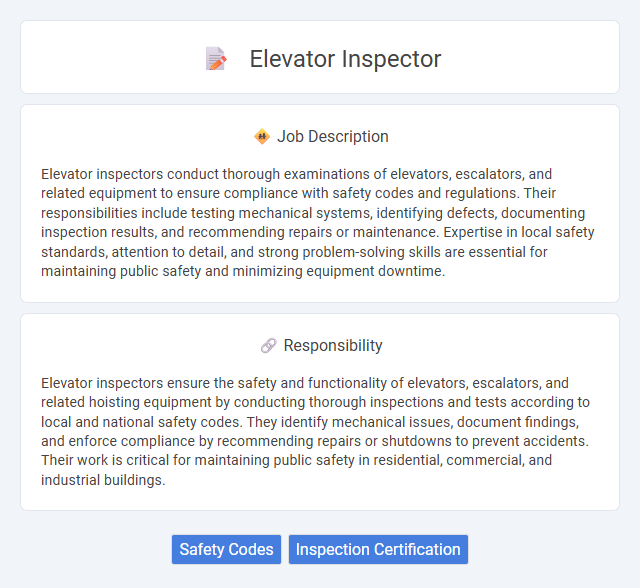
Elevator inspectors conduct thorough examinations of elevators, escalators, and related equipment to ensure compliance with safety codes and regulations. Their responsibilities include testing mechanical systems, identifying defects, documenting inspection results, and recommending repairs or maintenance. Expertise in local safety standards, attention to detail, and strong problem-solving skills are essential for maintaining public safety and minimizing equipment downtime.
Elevator inspectors will probably need to have good physical health, as the job may require climbing ladders and standing for long periods. Individuals with a strong attention to detail and mechanical aptitude are likely to be well-suited for this role. Those who struggle with confined spaces or have difficulty focusing on safety protocols might find this job less suitable.
Qualification
Elevator inspectors must hold certifications from recognized bodies such as the National Association of Elevator Safety Authorities (NAESA) or the International Code Council (ICC), validating their expertise in safety standards and regulations. A strong background in mechanical or electrical engineering, coupled with hands-on experience in elevator maintenance and repair, is essential for accurate inspections. Comprehensive knowledge of the ASME A17.1 Safety Code for Elevators and Escalators ensures inspectors can identify potential hazards and enforce compliance effectively.
Responsibility
Elevator inspectors ensure the safety and functionality of elevators, escalators, and related hoisting equipment by conducting thorough inspections and tests according to local and national safety codes. They identify mechanical issues, document findings, and enforce compliance by recommending repairs or shutdowns to prevent accidents. Their work is critical for maintaining public safety in residential, commercial, and industrial buildings.
Benefit
Elevator inspector jobs likely offer strong benefits including comprehensive health insurance and retirement plans, which contribute to long-term financial security. There is a probable opportunity for paid time off and flexible work schedules, supporting a balanced lifestyle. Career growth potential and job stability are expected due to the ongoing need for safety compliance in the elevator industry.
Challenge
Elevator inspectors face the challenge of ensuring the safety and functionality of complex mechanical systems while adhering to strict regulations. The job probably demands meticulous attention to detail and the ability to identify potential hazards before they cause malfunctions. High-pressure environments and evolving technology likely increase the difficulty of maintaining consistent inspection standards.
Career Advancement
Elevator inspectors play a critical role in ensuring the safety and functionality of vertical transportation systems, with career advancement opportunities often linked to obtaining certifications such as Certified Elevator Inspector (CEI) or becoming a state-licensed elevator inspector. Progression can lead to supervisory positions, project management roles, or specialization in complex elevator technologies and safety regulations. Continuous education, hands-on experience, and expertise in interpreting codes such as ASME A17.1 contribute significantly to career growth in this field.
Key Terms
Safety Codes
Elevator inspectors ensure compliance with local and national safety codes, such as the ASME A17.1 Safety Code for Elevators and Escalators, to maintain the safe operation of vertical transportation systems. They conduct detailed inspections of mechanical, electrical, and control systems, identifying potential hazards and code violations to prevent accidents and ensure passenger safety. Regular inspection and certification by qualified elevator inspectors are critical to uphold safety standards and minimize liability risks for building owners.
Inspection Certification
Elevator inspectors are responsible for conducting thorough safety and functionality inspections to ensure compliance with local, state, and federal codes. They issue inspection certifications that validate elevators meet all regulatory standards, preventing accidents and operational failures. These certifications are critical for maintaining public safety and are often required for building occupancy permits and insurance purposes.
 kuljobs.com
kuljobs.com